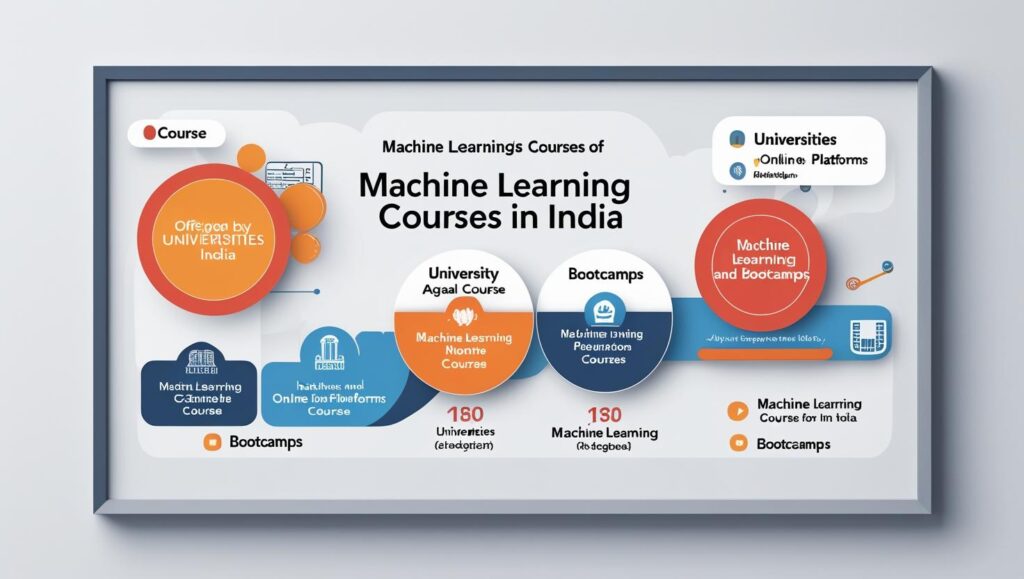Machine Learning (ML) is no longer confined to research studies or the labs of tech companies—it’s now a part of our everyday lives. In India, this transition is especially evident. Your bank detects suspicious activities in seconds, e-commerce websites suggest products you are most likely to buy, and health apps indicate potential health issues even before you book a doctor’s appointment. How to learn Machine Learning Courses in India.
Behind these innovations are skilled machine learning professionals, and the demand for them is skyrocketing. If you’ve been thinking about building a career in ML, 2025 might be the perfect year to take the plunge. However, with numerous Machine Learning Courses in India — from university programs to online boot camps — the choices can be overwhelming.
This guide will break it all down for you: what the options are, how to choose the right course, what skills you’ll learn, and where this career can take you.

Why Machine Learning Skills Are in High Demand in India
India’s technology sector is growing at a breakneck pace, and machine learning is at the heart of many breakthroughs. There are three main reasons for this surge in demand:
1. Business Adoption
Large IT firms, such as TCS, Infosys, and Wipro, now have entire teams dedicated to automation, natural language processing (NLP), and computer vision projects for their global clients. These companies need ML engineers who can design, train, and deploy models at scale.
2. Startup Ecosystem
Cities like Bengaluru, Hyderabad, and Pune have become hubs for AI-first startups. From predicting agricultural yields to building voice assistants in regional languages, these startups are solving uniquely Indian problems with machine learning.
3. Government Push
Initiatives like Digital India and the National AI Strategy are creating an environment where ML professionals can thrive. The government is funding AI research, encouraging industry partnerships, and even introducing AI-focused policies.
Types of Machine Learning Courses in India
Choosing the right type of course depends on your background, goals, and how much time you can commit. Here are the three main categories:
1. University Programs
If you’re looking for a deep academic foundation, university degrees are a solid choice.
- IITs & IIITs – Offer B.Tech and M.Tech programs with ML specializations, often including internships in top companies.
- IISc Bangalore – Known for its research-heavy ML curriculum and access to cutting-edge labs.
- NITs – Blend theoretical learning with practical ML projects.

Pros:
- Strong academic credibility
- Access to professors, labs, and research projects
Cons:
- Requires full-time commitment
- Competitive entrance exams
2. Online Learning Platforms
If you’re a working professional or student who needs flexibility, online platforms are ideal.
Popular choices:
- Coursera – Offers ML programs in partnership with IIT Bombay and deeplearning.ai.
- edX – Features ML courses from IIT Madras and IIT Kanpur.
- UpGrad – Collaborates with IIIT Bangalore for ML and AI specializations.
Pros:
- Learn at your own pace
- Access to industry mentors and project-based learning
Cons:
- Requires self-discipline
- Less networking compared to physical campuses
3. Bootcamps & Training Institutes
Bootcamps are short, intensive training programs aimed at making you job-ready fast.
Top names:
- Great Learning – Machine Learning Engineer Program with placement assistance
- AnalytixLabs – Specializes in applied ML for analytics and business
- Jigsaw Academy – Combines ML with broader data science training
Pros:
- Hands-on learning with real datasets
- Industry-focused curriculum
Cons:
- Limited depth compared to a full degree
- Intense pace may not suit everyone
Core Topics You’ll Learn in a Machine Learning Courses in India
A strong course should strike a balance between theory and practical applications. Expect to cover:
- Mathematics for ML – Linear algebra, probability, statistics
- Programming Skills – Mostly Python with libraries like Scikit-learn, TensorFlow, PyTorch
- Supervised & Unsupervised Learning – Regression, classification, clustering
- Deep Learning Basics – Neural networks, backpropagation, CNNs, RNNs
- Model Evaluation – Accuracy, precision, recall, F1 score, AUC
- Deployment – Integrating models into apps and production systems
How to Choose the Right Machine Learning Course in India
Here’s how to narrow down your options:
- Define Your Career Goals
- Research roles like ML Engineer, Data Scientist, or AI Researcher.
- Check Time Commitment
- University programs = 2–4 years
- Bootcamps = 3–6 months
- Online courses = Self-paced
- Set Your Budget
- Short-term programs: ₹50,000–₹1.5 lakh
- Full degrees: ₹5–8 lakh
- Look for Faculty with Industry Experience
- The best instructors have both academic and real-world project experience.
- Prioritize Hands-On Projects
- Real datasets and practical deployment experience make you job-ready faster.
Career Prospects After a Machine Learning Course
Machine learning opens doors across multiple industries in India:
- IT Services & Consulting – Work on global AI projects for Fortune 500 clients.
- Banking & Finance – Fraud detection, risk modeling, and algorithmic trading.
- Healthcare – Predictive analytics, diagnostics, drug research.
- E-commerce – Personalization, dynamic pricing, customer segmentation.
💰 Salary Range in India (2025 Estimates):
- Entry-level ML Engineer: ₹6–10 lakh/year
- Mid-level: ₹12–18 lakh/year
- Senior/Lead: ₹20 lakh+ in top companies
Trends Shaping Machine Learning Education in India (2025)
- AI Ethics & Policy Modules – Courses now cover bias, fairness, and AI laws.
- Industry-Curated Curricula – Companies co-create learning modules for job readiness.
- Regional Language AI – Growth in NLP for Hindi, Tamil, Bengali, Marathi, and more.
Tips for Success in Your ML Learning Journey
- Strengthen Your Math Base – Focus on statistics and linear algebra early.
- Practice Regularly – Use Kaggle, GitHub projects, and open datasets.
- Stay Updated – Read recent research papers, attend webinars, and AI meetups.
- Build a Portfolio – Showcase projects on GitHub and LinkedIn to stand out.

Q1. What is the eligibility for Machine Learning courses in India?
Most beginner-friendly ML courses require knowledge of mathematics (linear algebra, probability, statistics) and programming (preferably Python). For university programs, you usually need 10+2 with PCM for B.Tech or a bachelor’s degree in engineering, computer science, or mathematics for M.Tech/PG programs.
Q2. Which institutes offer the best Machine Learning programs in India?
Top institutes include IITs (Bombay, Madras, Kanpur), IIITs, IISc Bangalore, and NITs for degree programs. For professional training, platforms like Coursera, UpGrad, and bootcamps like Great Learning and AnalytixLabs are highly recommended.
Q3. How much do Machine Learning courses cost in India?
Online self-paced courses: ₹20,000–₹1.5 lakh
Bootcamps & institutes: ₹50,000–₹2.5 lakh
Full-time university degrees: ₹5–8 lakh (for 2–4 years)
Q4. What skills will I learn in a Machine Learning course?
You’ll learn mathematics for ML, Python programming, supervised & unsupervised learning, deep learning, neural networks, model evaluation, and deployment of ML models into real-world applications.
Q7. What is the average salary of a Machine Learning professional in India in 2025?
Entry-level: ₹6–10 LPA
Mid-level: ₹12–18 LPA
Senior/Lead roles: ₹20 LPA and above (depending on company & experience)
Final Thoughts
Machine learning in India has gone beyond buzzword territory—it’s now a career-defining skill. Take a formal degree, join an online course, or enroll in a bootcamp—whether you do it, the trick is balancing theory and real-world application.
If you maintain consistent effort, continue developing projects, and remain current with trends in the industry, you will be well on your way to a successful ML career in 2025 and beyond.

